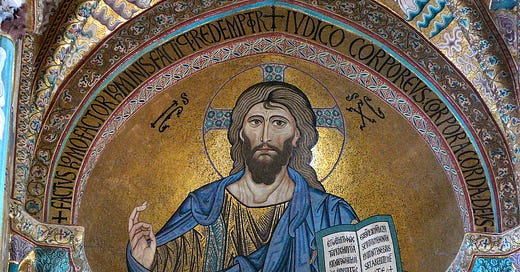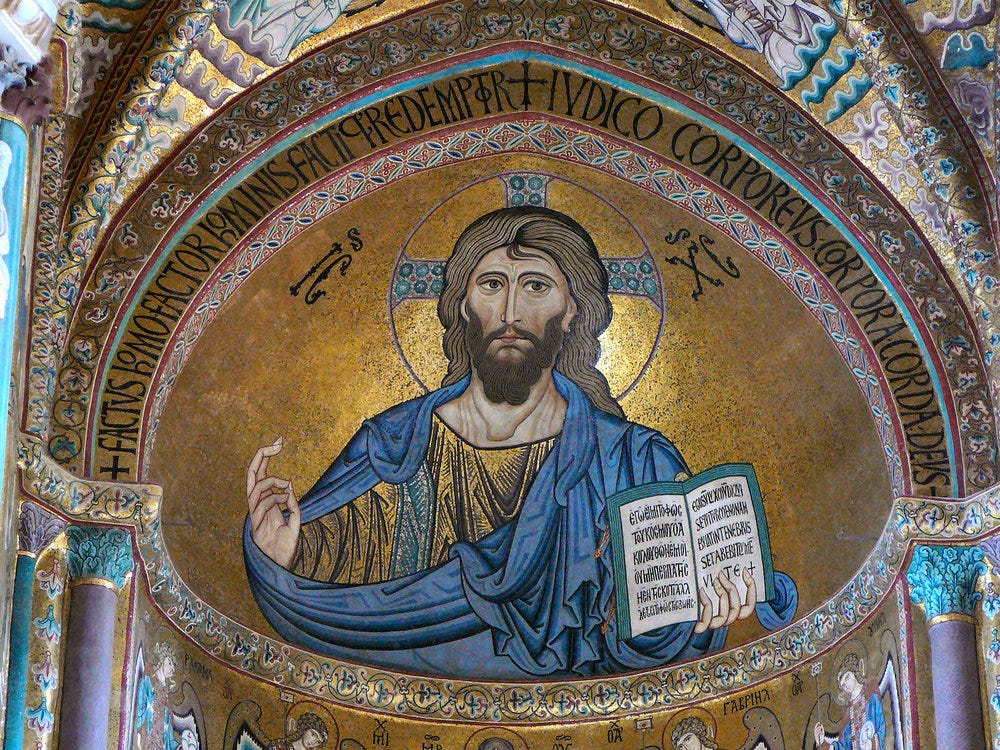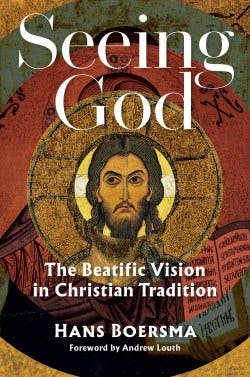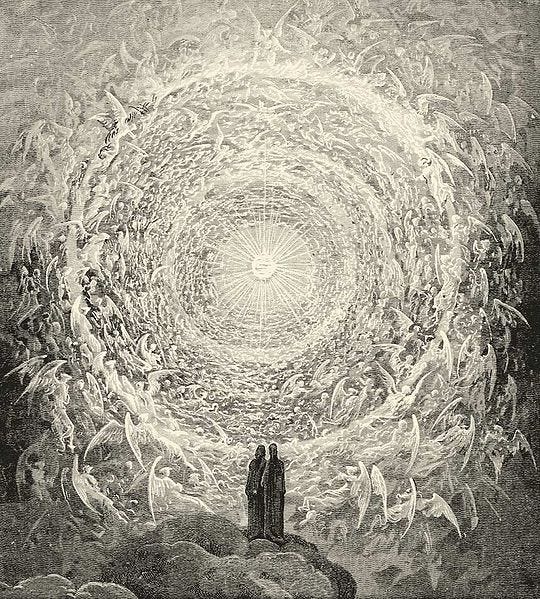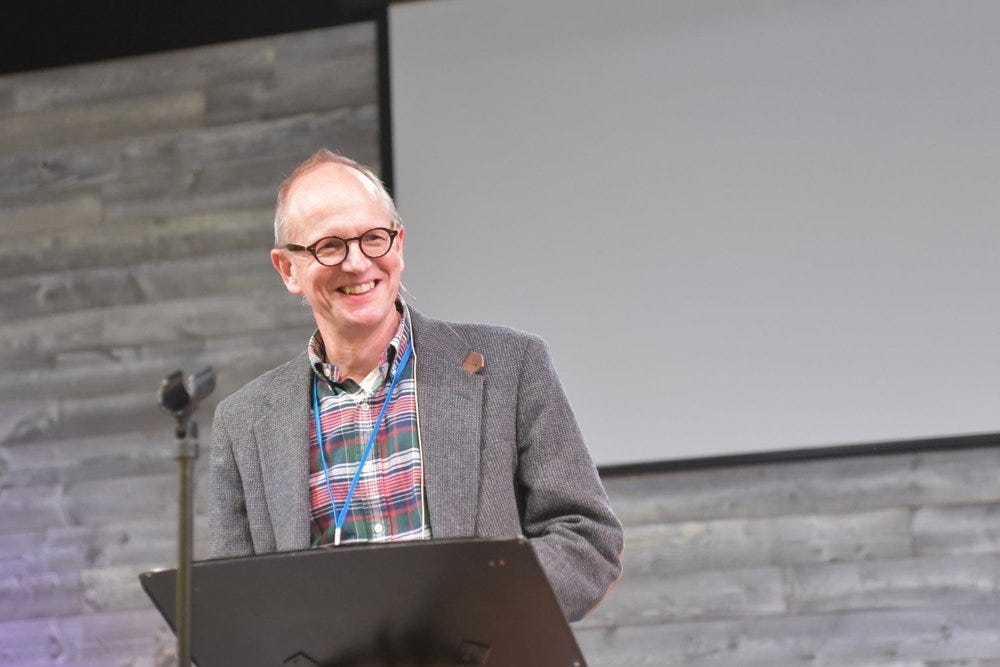(This is a cross-post from the Eerdmans blog. Banner image by Gun Powder Ma.)
What led you to write Seeing God?
Two things, mainly. First, if it is true that in the hereafter we will see God face to face, then I want to know as much as possible what that is like, keeping in mind the limits of our creaturely, this-worldly knowledge.
For me, it’s sort of like carefully studying a tourist brochure before going on a holiday somewhere. As much as is possible, you want to know about this place you’re going to visit. Or, going by the advice of seventeenth-century Puritan theologian Richard Baxter: “Fetch one walk daily in the New Jerusalem!”
Baxter felt—and in this he is in line with the preceding tradition, Orthodox, Catholic, and Protestant—that our meditative practices should be line with the goal that God has for us. I think Baxter was right. That’s not to say we should take the metaphor of vision in a literalist sense or that we can fully understand what the beatific vision will be like. It’s simply to say that we should deeply explore the resonances and implications of the metaphor, because this is one of God’s key ways of preparing us for eternal life.
The second reason I wrote the book is somewhat more polemical. The beatific vision does not get much attention in contemporary theology. In modernity, we have come to emphasize the continuity between this world and the next. Theologians want to highlight that it is this created order and this created body that will be redeemed. As a result they critique the earlier tradition, the way it highlighted that the eschaton is discontinuous with our life here and now.
They question the unremitting God-centered emphasis of the doctrine of the beatific vision. This shift in eschatological focus goes back to philosophical developments in the late Middle Ages. It is the result of the nominalist atomizing that characterizes the way we now typically understand how knowledge operates. For the good of the church and of our culture, we need to recover the earlier tradition’s otherworldliness and therefore also the beatific vision as lying at the very heart of our eschatological expectation. It’s only in God himself that we find rest for our souls.
What do you hope readers take away from reading Seeing God?
I’ve been struck in my reading by the Christ-centeredness of the beatific vision in much of the tradition. Time and time again, theologians have insisted that we know God only in Christ, and that this holds true also for the eschaton.
Gregory of Nyssa, Symeon the New Theologian, John of the Cross, Bonaventure, Nicholas of Cusa, Isaac Ambrose, John Owen, Jonathan Edwards—they all highlight this. To be sure, there are exceptions. Typically, when the beatific vision is interpreted as seeing the ‘essence’ of God, Christology takes a backseat. But by and large, theologians have understood the vision of God as a deepening of our knowledge of God in his self-revelation in Christ. That’s a beautiful thing, and something that needs to be central to the doctrine of the beatific vision.
This also means—and that’s the second thing I should mention here—that the fullness of the vision of Christ (our ultimate aim) is realized in some refracted manner already today. Already today we have some vision of God. You can think here of Jesus’s words to Philip in John 14:9: “Whoever has seen me has seen the Father.” Philip already participated in the vision of God when he saw Jesus. The telos or aim of the beatific vision begins to take shape in our lives today. We are made for the beatific vision, and that means that in some manner we sacramentally begin to share in it already today.
What challenges did you face in writing Seeing God?
The main challenge has been the question of how to articulate that we come to share in the life of God. Seeing God face to face means that we are in some way united to him. East and West have different ways of articulating this.
Eastern theologians tend to argue that we will participate in the energies or operations of God, while we will never comprehend God’s essence. It’s a position that builds on the early fathers (going back all the way to Saint Irenaeus), and the purpose of the distinction is to safeguard God’s transcendence. The West also holds to participation and deification, but Western theologians (particularly in the Thomist tradition) have argued that although we may not see the divine essence now, we will do so in the eschaton.
Aquinas, trying nonetheless to uphold the creator-creature distinction, explains that even in the eschaton we will not truly comprehend the divine essence, even though we may reach it and see it. I’ve struggled long and hard about what to do with this issue. In the end, it seems best to me to say that when God reveals himself in Christ, he reveals his essence, his love. This love is infinite, and we’ll never reach the end of it. So, perhaps we should say that whenever we see God’s love in Christ, we see his essence, and we’ll never plumb the depths of it—not even in the eschaton.
Imagine you’re in a giant used bookstore. After you’ve vetted the theology section, what other sections do you find yourself drifting into?
I’m a strange bird that way. Believe it or not, I find bookstores miserable places to visit. Lots of colleagues tell me that being in a good theological bookstore is like being in a candy store. That’s not true for me. I actually find bookstores overwhelming. There’s so much there that I would love to read that I just don’t know where to start.
I have a wide variety of interests, and—perhaps counter-intuitively so—bookstores make me a little depressed. Most of the books there I haven’t read, and many of them I didn’t even know exist. That said, I do browse used bookstores, and once I’ve looked at the theology section, I will typically turn to philosophy and history. I love books dealing with the history of ideas. Genealogical questions about cultural development fascinate me.
What’s something not many people know about you?
Well, I’m a fairly private and introverted person. Although I do reach out to people, I also believe there are things other people do not have a right to know or even ask about you. Our social media are eroding the last vestiges of privacy, and I think the consequences for our ability to live out of a stable sense of identity are devastating. I hate Twitter and Facebook. Not many people know that I think they don’t have the right to know everything about me, but there you are!
I also believe there are things other people do not have a right to know or even ask about you.
But I should probably answer the question, right? So, one of the things many people don’t know about me is that as a Dutch immigrant to North America, I always feel conflicted when I go back to visit my family in the Netherlands. I love the country, its history, its architecture, its landscape. Whenever I visit, I wonder whether I did the right thing as a 22-year-old in moving to Canada. And yet, my life is here, our kids and grandkids are here, and I know I couldn’t really go back. I suppose my feeling conflicted about this is just an indication of how deeply we are shaped by the particulars of the place where we grow up and of the people whose history makes us who we are.
What’s the best advice you can give aspiring theologians?
Consciously take the posture of an apprentice! I purposely use the language of apprentice rather than student. An apprentice is someone who is trained by a master into certain practices, into a certain skill set. Irenaeus treated the entire history of salvation as an apprenticeship—with God training us into maturity over time. It’s a beautiful vision, and it holds true also for individual aspiring theologians. The implications are numerous, I think.
An apprentice is someone who is trained by a master into certain practices, into a certain skill set.
An apprentice wants to learn practices. That requires information, but the purpose is not intellectual knowledge; the purpose is to join God in what he is doing in the world. An apprentice looks to the skillful master for an example on how to go about this. To become a theologian, therefore, you need to entrust yourself to others. You need the humility of allowing experienced theologians to guide you in the process. That’s a tough thing to do. And, perhaps most importantly, as an apprentice you take your place within a tradition that precedes you.
The Spirit has been at work prior to you starting your journey, and it’s only within the tradition (and within the church, therefore) that you can mature as a theologian. The primary stance of an apprentice is one of trust—trust that these skills that the tradition teaches me are good. Only when I indwell the church’s tradition can I also put question marks here and there, and ask: how well does this or that theological articulation fit in the broad context of the church’s reading of the Scriptures?
I’m an analyzer and a critic by character. But I’ve learned (and keep learning) that those are secondary skills and that when we make them the primary ones, we cannot make progress in reaching the perfection or maturity that God has in mind for us.
View the contents of Seeing God here.
Purchase Seeing God at Amazon, Barnes and Noble, Christianbook.com, or your local independent bookstore. If you're in Vancouver, the book is currently available at Regent College.

